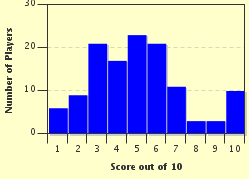Quiz Answer Key and Fun Facts
1. The Anglo-Zanzibar War began on August 27, 1896. The cause for the war was the sudden death of the pro-British sultan and the succession of a new sultan that was certainly not Britain's first choice as a replacement. However, what stands out most about this war was how long it lasted. Approximately how long was the Anglo-Zanzibar War?
2. Which of the following is NOT one of the many wars waged between the United States and Native American tribes?
3. In 1325 a war broke out between the Italian cities of Bologna and Modena. While the true root of this conflict related to each city supporting different religious leaders/overlords, it all began when soldiers of Modena stole what from the city of Bologna?
4. From the 1500s through to the 1800s, the nation of Spain engaged in 'asiento,' a series of agreements with other nations allowing them to transport, trade, and sell slaves in Spanish America. From 1739-1748, Britain and Spain engaged in a war over these agreements; it all began in the Caribbean, when the Spanish guard boarded a British vessel, accused Captain Robert Jenkins of smuggling, and proceeded to cut off which part of his body?
5. In 1925 Bulgaria was invaded by Greece and they battled for 10 days. Some claim that the battle began because Bulgarian soldiers crossed the border into Greece and killed two of their military leaders without reason. However, an even more popular version is that the war began after a Greek soldier was shot by Bulgarian soldiers after crossing the border into Bulgaria to chase after what?
6. The First Barbary War took place form 1801-1805 and was fought in North Africa between the United States and what were known as the 'Barbary States.' It all began after Barbary pirates, or corsairs, attacked American merchant ships, stole their goods and enslaved the crews. Which of the following was NOT one of the Barbary states?
7. During World War II, the Guadalcanal Campaign was the first major invasion by Allied troops against Japan. At the same time, however, Japan was invading and battling in the Aleutian Islands Campaign on what would eventually become U.S. soil in 1959. In what state was this campaign?
8. The United States and England signed the Oregon Treaty in 1846, which settled the boundary dispute over access through the Haro Strait, the Rosario Strait and the San Juan Channel along the San Juan islands off of the northern coast of the United States and, what is now British Columbia, Canada. However, a war was waged between the two nations thirteen years later; it all began after an American farmer on one of area's islands shot an animal trespassing on his property. What type of animal did the farmer shoot?
9. The Football War, also known as the the '100 Hour War,' took place in 1969. While the underlying reason for the conflict stemmed from economic and immigration hostilities, it all kicked off during the second qualifying round of the 1970 FIFA World Cup. Which two nations were at the center of this conflict?
10. In 1932 a massive group of hunters, armed with machine guns, waged war against an invasive species that was destroying crops all over Western Australia. What animal was hunted in this war?
Source: Author
KatieK54
This quiz was reviewed by FunTrivia editor
bloomsby before going online.
Any errors found in FunTrivia content are routinely corrected through our feedback system.

